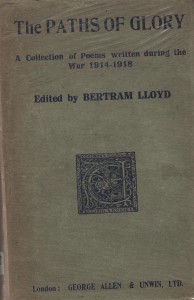
Today, a hundred years on, most historians find it difficult to justify the carnage that was the Great War. Back in 1919, many were morally divided on the issue. One man who saw the fight against German brutality as a wholly justified, glorious crusade, was the poet and playwright Henry Newman Howard (1861 – 1929). On reading The Paths of Glory, an anthology of anti-war poetry, he sent a scathing letter to its pacifist editor, Bertram Lloyd. A typewritten copy of this letter was recently found, tucked in with a batch of press cuttings relating to the offending book, in a copy of it , which may have been Lloyd’s own, that ended up the library of Maria Assumpta College, Kensington and was subsequently de-accessioned into the secondhand book trade.
Here in full is Howard’s letter to Lloyd:
29 Jan 1919
25, Charlbury Road,
Oxford.
Sir,
Your’ anthology ‘of War Poems is a crime. I grieve that the publishing house fathered by noble John Ruskin should be Sponsors to this execrable publication. Never again will I purchase a book bearing the stamp fouled by the guilt of this sinister booklet. Other books there are one recalls as foul things. Il Principe, possibly John Davidson’s Testament; Nietzsche—these last, like the German Empire, died mad of their guilty thoughts. Your book, garbage from end to end—if not in the individual poems, assuredly in their bringing together—carries the sickly unction of a spurious humanitarianism.
Continue reading
